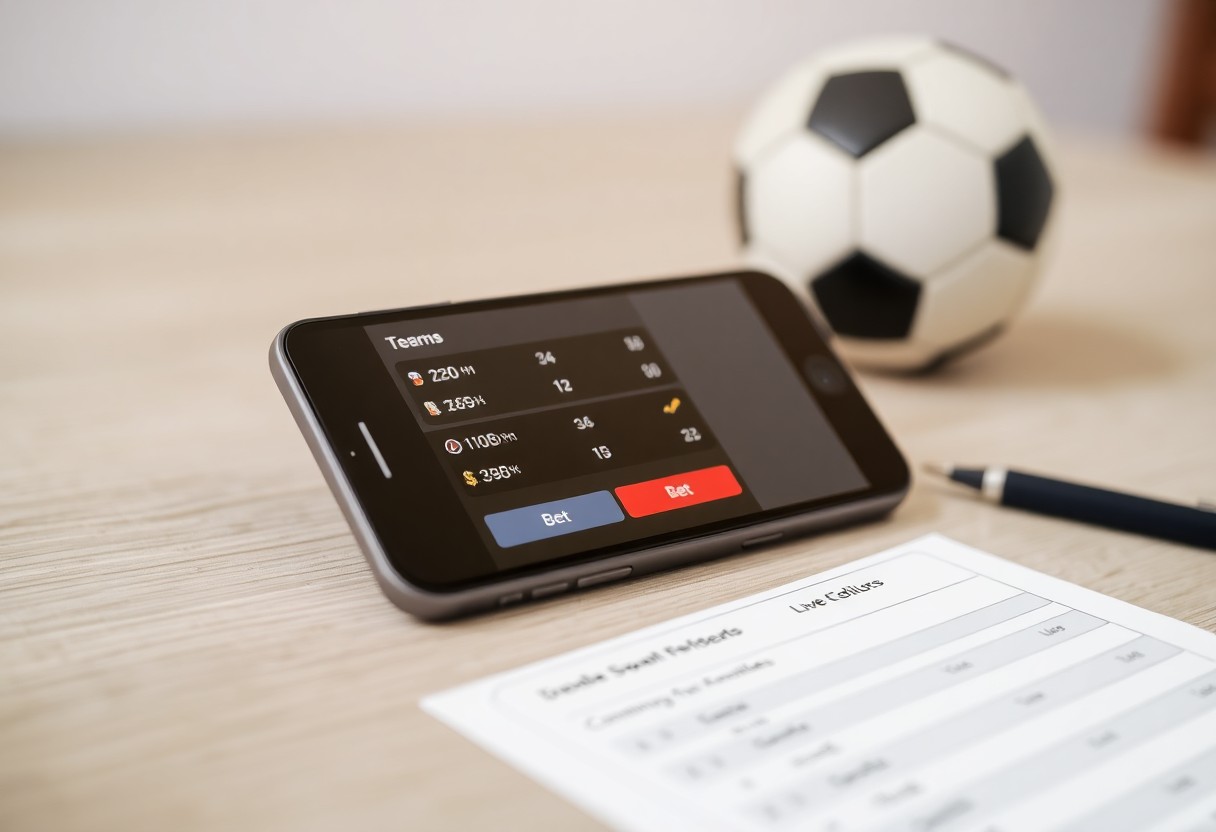Just understanding the importance of bankroll management is important for successful live betting. A well-structured strategy helps bettors navigate the volatility of real-time wagering while maximizing potential profits and minimizing losses. By setting clear limits and employing disciplined staking methods, bettors can effectively balance risk and reward, ensuring their enjoyment of the betting experience without jeopardizing their finances. This post will explore key principles and actionable tips for managing your bankroll effectively, allowing you to thrive in the fast-paced world of live betting.
Understanding Bankroll Management
Effective bankroll management is the backbone of successful betting, especially in live betting scenarios where the dynamics can shift rapidly. It involves setting aside a specific amount of money dedicated solely to betting, while also determining how much to wager on each bet based on individual risk tolerance and game circumstances. This strategy prevents emotional decisions influenced by wins or losses, fostering a disciplined approach to betting over the long term.
What is Bankroll Management?
Bankroll management refers to the systematic approach of handling your betting funds to maximize longevity and profitability. By allocating a defined sum for wagering and adhering to specific betting limits, players can mitigate risks associated with losing streaks. This method allows bettors to make informed decisions, focusing on winning strategies rather than emotional reactions to outcomes.
Importance of Bankroll Management in Live Betting
In live betting, where odds fluctuate constantly, effective bankroll management protects against hasty decisions driven by momentary events. Allocating a fixed percentage of the bankroll for each bet fosters discipline even amidst the excitement of changing circumstances. Such analysis enables bettors to approach wagering strategically, increasing their chances of maintaining a profitable edge over time.
Without stringent bankroll management, bettors often face significant risks, particularly in the fast-paced environment of live betting where opportunities and challenges abound. Data indicates that players who apply sound bankroll practices are less likely to experience devastating losses during downturns. For instance, the “1% rule,” which suggests wagering no more than 1% of your bankroll on any single bet, has proven effective in preserving funds. This strategy allows for sustained participation in live betting events, empowering bettors to capitalize on favorable conditions rather than risking financial ruin due to impulsive betting decisions.
Setting Your Bankroll
Effective bankroll management begins with a clear understanding of your financial landscape. Identify how much money you can comfortably allocate to betting without financial strain. This amount should be separate from your everyday expenses, ensuring that fluctuations in betting do not affect your personal finances.
Determining Your Total Bankroll
Assess your overall financial situation to determine your total bankroll. This should be an amount that you can afford to lose without impacting your lifestyle. A common recommendation is to limit your betting bankroll to 1-3% of your total assets or income, reinforcing the principle of responsible gambling.
Establishing a Betting Unit
Establishing a betting unit helps to create consistency in your wagering approach. A standard unit often equals a fixed percentage of your total bankroll—typically 1-2%. If your total bankroll is $1,000, a $10 betting unit represents 1% of your bankroll. This method allows you to manage risk effectively, ensuring that no single bet can overly jeopardize your funds.
Choosing a betting unit based on your total bankroll not only promotes disciplined betting but also helps in tracking performance. For instance, if you set a betting unit at 2%, this means that if your bankroll increases to $1,200, your new betting unit will be $24. By adjusting your unit relative to bankroll fluctuations, you maintain a sustainable approach to betting, minimizing the risk of substantial losses while maximizing potential gains.
Risk Assessment in Live Betting
Effective risk assessment in live betting hinges on analyzing real-time data alongside historical trends. The dynamic nature of live events allows bettors to capitalize on shifting odds but also increases exposure to unpredictable outcomes. Evaluating injury reports, player performance metrics, and game context can inform better risk profiles. Investing time in research and situational analysis can greatly enhance decision-making capabilities, allowing for more calculated bets amidst the volatility of live wagering.
Understanding Variance and Probability
Variance plays a significant role in live betting, where outcomes can swing dramatically within moments. Understanding probabilities helps bettors gauge the likelihood of specific events occurring, ultimately guiding their betting choices. For instance, if a team’s win probability shifts from 60% to 30% after a key player injury, recognizing this change can prevent significant losses and foster informed wagers.
Evaluating Risk vs. Reward
A comprehensive evaluation of risk versus reward is integral to successful live betting strategies. This involves assessing the potential gains against the likelihood of losing a wager. In live betting, odds fluctuate rapidly, providing opportunities for high-reward scenarios but also creating pitfalls. Analyzing historical outcomes and bet types can help identify patterns; for instance, betting on underdogs may yield 3-to-1 returns, but the inherent risk of their winning is much higher.
Evaluating risk versus reward entails a deep investigate metrics and situational awareness. When weighing a bet, consider not just the potential payout but also the chance of a loss relative to the money on the line. For example, a bet with 4-to-1 odds looks enticing, but if that team’s historical win rate is below 25%, the risk may outweigh the reward. Implementing a graded approach to risk can further solidify betting strategies, allowing for incremental increases in stake when confidence levels are high and cautious withdrawals during downturns.
Strategies for Live Betting
Successful live betting strategies leverage real-time insights and prompt decision-making. Punters often identify value bets by observing shifts in odds caused by game dynamics. Utilizing a combination of statistical analysis and instinct can lead to lucrative opportunities, especially during critical game moments when the odds fluctuate dramatically.
Choosing the Right Bets
Focus on identifying momentum shifts and key player performances that can drastically influence odds. For example, a sudden injury to a star player can create favorable conditions for betting against the team facing them. Staying updated with live stats and incorporating knowledge about team strategies enhances the ability to spot these opportunities.
Adjusting Bets In-Game
Adapting bets during the game is imperative for maximizing potential returns. Observing in-game developments allows bettors to evaluate changing circumstances, such as player fatigue or tactical adjustments. For instance, if a team is dominating possession but struggling to convert, betters might consider hedging their earlier bets to mitigate risk or double down on alternative bets that reflect emerging patterns.
Live betting requires real-time analysis and flexibility. If a team is dominating in the first half, odds may not reflect the potential for an upset. Adjusting bets accordingly, such as placing a bet on a comeback or enhanced spreads, can yield a substantial profit. Using tools like in-game stats and predictive models can help bettors make informed decisions quickly, capitalizing on fleeting opportunities as they arise during the match.
Tracking Your Progress
Effective tracking empowers bettors to refine their strategies and maximize profits. Documenting each bet allows a thorough review of decision-making processes and outcomes, revealing patterns over time. Utilizing spreadsheets or dedicated betting apps facilitates this tracking, making it easier to analyze performance and adjust accordingly.
Keeping Records of Your Bets
Meticulous record-keeping plays a significant role in assessing the effectiveness of your betting strategy. Each entry should include details such as the event type, odds, stake, and outcome, creating a comprehensive database. Digital templates can streamline this process, ensuring consistency and ease of access for future analysis.
Analyzing Wins and Losses
Deep analysis of wins and losses can unveil insights that significantly impact future betting decisions. Scrutinizing betting patterns, odds, and timing enhances understanding of successful strategies versus missteps. For example, if a bettor finds consistent success with a certain team at home but struggles away, adjusting focus accordingly can lead to more favorable outcomes.
Identifying the reasons behind losses is vital for improvement. For instance, a bettor who frequently loses when wagering large amounts might find that smaller, more calculated bets yield better results. Analyzing specific contexts like player injuries or weather conditions may further refine strategies. By systematically reviewing decisions, identifying biases, and recognizing trends, bettors can enhance their chances of success in the dynamic world of live betting.
Tips for Sustainable Betting
Implementing sustainable betting practices can significantly extend your engagement in live betting while protecting your finances. Focus on establishing a strong foundation by adhering to these guidelines:
- Set clear betting limits for each session.
- Track your wins and losses meticulously.
- Embrace a long-term perspective on profits.
- Utilize data analysis to base decisions.
- Stay informed about current events affecting outcomes.
Assume that consistent application of these strategies builds a more resilient betting approach over time.
Avoiding Common Pitfalls
Many bettors fall prey to easily avoidable mistakes that jeopardize their bankrolls. Relying on emotions instead of data can lead to impulsive wagers, while ignoring stakes can quickly drain funds. Always ensure that you remain focused on the bigger picture, setting realistic expectations and sticking to planned strategies without letting short-term losses sway your judgment.
Maintaining Discipline in Betting
Discipline is the backbone of successful live betting. Establishing a regimented approach helps bettors resist the temptation to chase losses or deviate from their strategy. Sticking to predetermined rules, such as never betting more than a specific percentage of your bankroll, can lead to better long-term outcomes.
Creating a structured betting schedule and adhering to it will reinforce disciplined behavior. For example, dedicating certain days or times for betting allows you to approach each session with a clear mindset. Additionally, taking regular breaks helps prevent burnout and impulsive decision-making. Ultimately, maintaining strict adherence to your betting plan not only preserves your bankroll but also enhances confidence and decision-making clarity in the long run.
To wrap up
Taking this into account, effective bankroll management is imperative for live bettors to navigate the inherent uncertainties of betting. By strategically allocating funds and assessing potential risks against possible rewards, bettors can maximize their opportunities while minimizing losses. An understanding of personal limits, combined with disciplined decision-making, allows for a more sustainable approach to betting. Ultimately, mastering this balance not only enhances the betting experience but also increases the likelihood of long-term success in the volatile world of live wagering.
FAQ
Q: What is bankroll management in the context of live betting?
A: Bankroll management refers to the strategy of allocating funds for betting over a certain period. It involves setting limits on how much to wager on each bet to ensure sustainability and minimize the risk of losing the entire bankroll. Effective bankroll management allows bettors to make more strategic and informed decisions during live betting events.
Q: How can one determine the appropriate stake size for each bet?
A: The appropriate stake size can be determined by calculating a percentage of the total bankroll. A common approach is to bet 1-5% of the total bankroll on a single wager, depending on confidence levels and risk tolerance. This method helps to mitigate losses and allows for multiple betting opportunities without depleting the bankroll too quickly.
Q: What strategies can be employed to maximize rewards while managing risk effectively?
A: To maximize rewards while managing risk, bettors can employ strategies such as diversifying bets across different events, using value betting to identify advantageous odds, and practicing disciplined staking methods. Additionally, monitoring performance and making adjustments based on outcomes can enhance overall betting effectiveness without exposing the bankroll to unnecessary risks.




